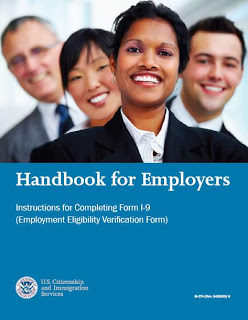Company information that is sensitive, but may not rise to the level of a trade secret is protectable in California, isn’t it?
Michael Allen
Recent Posts
Tags: Confidential Information, CUTSA, Preemption, California, HR Allen Consulting Services, HR Informant
Senate Bill 1193, passed last year, requires specified businesses and establishments to post an 8.5” x 11” notice, on or before April 1, 2013.
The required posting provides important information on how to report suspected human trafficking and also provides victims of human trafficking with information on where to obtain help. The notice informs the public and victims of human trafficking of telephone hotline numbers and contains information about organizations that provide services to eliminate slavery and human trafficking.
The State of California Department of Justice (DOJ) developed the model notice that complies with the requirements of SB 1193.
California “is one of the nation’s top four destination states for trafficking human beings,” according to the DOJ. Human trafficking, as the DOJ states, is “a modern form of slavery. It involves controlling a person through force, fraud, or coercion to exploit the victim for forced labor, sexual exploitation or both.”
Applies Only to Specified Businesses and Establishments
Tags: employer, English, human trafficking, posting requirement, SB 1193, Spanish, HR Allen Consulting Services, HR Informant
During a conference in San Francisco, Richards tweeted that it was “Not cool” that the men were making inappropriate sexual jokes. She used her phone to take a picture of the men sitting behind her and then used Twitter to post the picture.
One of the men in the photo was terminated by his employer, San-Francisco based PlayHaven.
But Richards also found herself in the middle of a social media storm and was ultimately fired by her employer. SendGrid CEO Jim Franklin blogged that Richards was not fired because she reported offensive conduct, but because of how she reported it – using Twitter to post photographs and “publicly shaming” the offenders.
Franklin also went on to say that Richard’s actions caused division amongst the developer community that Richards serves as part of her job and that she can no longer be effective.
But this is what often happens when an employee complains of inappropriate conduct: A complaint is made, which may create division at work and with customers; people may take sides. Regardless of such division and the ultimate outcome of any investigation, the employee is supposed to be protected from retaliation for complaining of harassment or discrimination.
This situation poses difficult questions: Can an employee complain in any manner he/she sees fit? Airing information across social media platforms and posting pictures of co-workers, customers or collaborators?
The law provides strong protections for those who complain about harassment or discrimination. As demonstrated by recent decisions by the National Labor Relations Board, the law also protects employees who engage in concerted activity with other employees to improve their working conditions — which may include employees complaining to each other over social media.
The San Jose Mercury News explored the legal ramifications of the situation. Discussing the incident, Rob Pattinson, a Jackson Lewis attorney who represents employers, remarked, “It’s a tough one … The law is strong in protecting people who make complaints of harassment, or who participate in an investigation about complaints of harassment.”
Tags: Retaliation, sexual harassment, protected activity, employees, HR Allen Consulting Services, Employers, HR Informant, NLRB, social media
Businesses in the U.S. and U.K. lose $37 billion a year simply because workers do not fully understand their jobs, according to a new IDC white paper commissioned by Cognisco, an employee-assessment specialist. Their confusion results in unplanned downtime, regulatory penalties, and other costs to companies.
Communicating effectively is a must-have leadership skill, one that’s essential to managing employees and growing a business. Although we have more tools than ever for sharing ideas — from texting to video conferencing — it seems that everyone is talking, but very few of us are truly listening. It’s imperative that employers and employees learn not only to hear each other out, but also to process what’s being said.
Here are three tips for sharpening your listening skills.
- Don’t multitask. We live in a world of smartphone and computer alerts. Resist the temptation to check in every time one goes off. Studies show that our productivity drops by 10 percent whenever our focus is interrupted by unrelated sounds, so you’re better off checking messages later. Meanwhile, respect your colleagues by giving them your undivided attention when they are speaking to you.
- Repeat what you hear. Studies show [PDF] that we only retain about half of what we hear, and our retention rate drops to about 25 percent a few days later. By practicing active listening techniques, we can hold onto more of that information — and put it to better use. Simply listen to what a person says and then repeat it back. (Paraphrasing is OK.) This has two benefits: It illustrates that you’ve heard what someone has said, and it ensures that you’ve understood the message as intended.
- Ask questions. While someone is sharing information with you, ask questions related to the topic at hand. This demonstrates that you’re listening and forces you to remain an active part of the conversation. Great leaders actively solicit feedback from employees, and great employees show they are engaged in projects by asking questions that will improve their odds of success.
Tags: Productivity, communication, employees, HR Allen Consulting Services, HR Informant
New York State’s Attorney General called on the National Football League (NFL) to be mindful of the state’s anti-discrimination laws.
Attorney General Eric Schneiderman sent a letter last week to NFL Commissioner Roger Goodell reminding him that the NFL and its franchises must not discriminate against players and draft prospects on the basis of sexual orientation.
In addition, Schneiderman noted that at least two dozen of the 32 NFL teams are headquartered in jurisdictions that have similar employment discrimination laws in place.
Schneiderman called on the NFL to issue a formal written policy making clear that any form of discrimination or harassment based on sexual orientation is a violation of New York law. The NFL’s headquarters are located in New York City.
The letter was prompted by recent reports that some draft prospects were asked questions about their sexual orientation at a national recruitment event. One draft prospect, Nick Kasa, told an ESPN radio show that “They ask you, ‘Do you have a girlfriend?’ ‘Are you married?’ ‘Do you like girls?’”
Similar to New York, California also prohibits discrimination and harassment on the basis of sexual orientation. California’s Fair Employment and Housing Act prohibits employers from discriminating against employees and job applicants.
Tags: employment discrimination, New York, sexual orientation, California, HR Allen Consulting Services, Employers, HR Informant, harassment
Both federal and California law have long forbidden religious discrimination in employment, while also requiring employers to grant reasonable accommodations for religious observances. A common accommodation is to modify a policy to enable an employee to engage in a particular religious observance (such as not working on the Sabbath). California has now set itself apart with the recent amendments to the FEHA.
Tags: Legislation, FEHA, Discrimination and Harassment, Guest Author, HR Allen Consulting Services, HR Informant
The significant tax breaks and other incentives available to employers that hire veterans have inspired many to increase their veteran recruitment efforts. Some companies have even begun to advertise themselves as “veteran friendly.”
But there’s more to being a veteran-friendly employer than just a company’s willingness to hire veterans. The following are steps companies can take to ensure job-seeking veterans respond to recruitment efforts are feel welcomed once hired.
Tags: ADA, veterans, hiring veterans, tax incentives, HR Allen Consulting Services, HR Informant, California employers
Among the many California Peculiarities that employers must face are special rules on personnel record keeping. In 2012 the Legislature, in enacting AB 2674, made those rules yet more complicated and onerous. Until December 31, 2012, employer obligations to make employee performance records or grievances available were drawn out in the seven subdivisions of Labor Code section 1198.5(a)-(g). Effective January 1, 2013, the statute’s subdivisions now number seventeen, reflecting nine key changes:
Tags: Recordkeeping, Legislation, Access to Employee Records, HR Allen Consulting Services, HR Informant
Oh, L’Amour. As Valentine’s Day approaches and the flowers and cookie bouquet deliveries start roaming the hallways, it is time for us to turn our sights on one of the most innocent-seeming, yet problematic, aspects of employment law: the workplace romance.
Tags: Discrimination and Harassment, Love Contract, HR Allen Consulting Services, HR Informant
As HRInformant previously reported, U.S. Citizenship and Immigration Services (USCIS) recently revised the Form I-9. The USCIS also publishes a handbook with useful information for employers to assist them in completing the Form I-9.
The USCIS updated the Handbook for Employers, Guidance for Completing the Form I-9 (M-274) to include information about the revised Form I-9.
According to the USCIS, helpful new images have been added to the Handbookto illustrate how employees and employers can complete Sections 1-3 of the new form. The Handbook also contains updated guidance on recording changes of name and other identity information.
Tags: HR Allen Consulting Services, HR Informant, : Form I-9



























